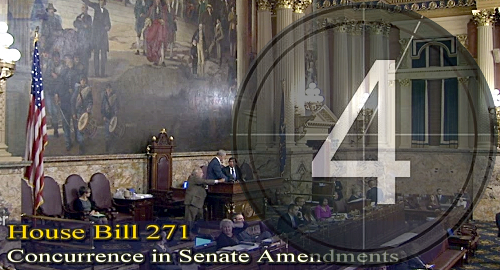 At long last, Pennsylvania legislators have approved a sweeping expansion of gaming, including intrastate online gambling.
At long last, Pennsylvania legislators have approved a sweeping expansion of gaming, including intrastate online gambling.
On Thursday morning, Pennsylvania’s House of Representatives approved HB-271, which authorizes online casino and poker sites, daily fantasy sports, online lottery sales, mobile gambling at airports, 10 new ‘satellite’ casinos, video gaming terminals at select truck stops and – provided there’s a change in federal law – legal sports betting.
HB-271 was approved by the state Senate on Wednesday, but 279 pages worth of amendments caused House reps to demand more time to process the changes. The House reconvened Thursday morning at 8am, and following several hours of rather pointless debate, voted to approve the measure by a margin of 109-72, leaving only Gov. Tom Wolf’s signature for the bill to become law.
Among the amended bill’s more contentious surprises was the imposition of a 54% tax on online slots revenue, mirroring the state’s industry-high land-based rate, while online poker and casino table game taxes were set at a more reasonable 16%.
Online casino represents 90% of New Jersey’s regulated online gambling revenue, and slots dominates the casino vertical, so Pennsylvania’s punitive slots tax will no doubt discourage many operators from seeking online licenses.
Perhaps anticipating negative reaction to this tax plan, Pennsylvania is offering separate licenses for online slots, poker and casino table games, allowing operators to get their feet wet without straying into the extremely deep end of the tax pool.
On a similar front, Pennsylvania’s proposed sports betting tax has been set at 36%, or over five times what sports betting operators in Nevada – currently the only state in which single-game sports betting is permitted – currently pay. Gambling operators are likely already on the phone with lobbyists about convincing legislators that some form of tax rethink is necessary if the state hopes to realize its gaming revenue ambitions.
Questioning on the House floor on Thursday indicated that the state expects its expanded gaming program to contribute $238.5m to the state budget for the current fiscal year, with recurring annual revenue of between $80m and $100m.
Pennsylvania joins Delaware, Nevada and New Jersey as the only US states that currently permit some form of non-lottery online gambling. New Jersey was the last state to come online, after Gov. Chris Christie signed the necessary legislation into law in February 2013.
It remains to be seen whether it will be another four-and-a-half years before a fifth state joins the intrastate online party, or whether Pennsylvania’s progress can pull the cork out of the bottleneck that has prevented states like California, Illinois, Michigan and New York from passing their own intrastate online legislation.